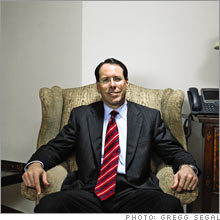AT&T's new guyThe telecom giant's new chief is a little different from his predecessor. He's approachable and pop-culture-savvy, and actually has a PC in his office.(Fortune Magazine) -- Randall Stephenson, the 47-year-old Oklahoman who takes over as chairman and CEO of AT&T in a few weeks, likes to download movies to his computer (legally), uses blogs to keep up with industry news, and gets high-definition television pumped through his home telephone line. On the personal technological adoption curve, that puts him slightly ahead of the typical AT&T customer - and way out in front of departing AT&T chief Ed Whitacre, who doesn't even have a computer in his office.
Tech savvy isn't the only thing that separates the two: The 65-year-old Whitacre, who served as CEO of AT&T (Charts, Fortune 500) - and SBC before that - for a total of 17 years, is a man of few words who rides his executives hard. He's the Clint Eastwood of telecom: flinty and deadpan. Stephenson is more like the industry's Tommy Lee Jones: a more loquacious character who can deliver results while making (or taking) a joke or two. But deep down, Stephenson is pretty old-school. He has worked for the phone company his whole career, starting with a part-time job as a "tape monkey" - someone who loaded the tapes for billing systems - at the old Southwestern Bell. In an interview with Fortune, he coughs up the names of two role models: Whitacre and Carlos Slim Hel�, the Mexican industrialist who happens to be one of the richest men in the world. (He and Warren Buffett run neck-and-neck for the No. 2 spot.) Stephenson got to know Slim when Whitacre dispatched him to Mexico City in 1992 to oversee the company's roughly 10 percent investment in Tel�fonos de M�xico. During his three-year stint, he watched Slim weather a peso crisis in 1994 by buying back Telmex stock on the cheap and slashing capital expenditures. Slim asked Stephenson to suggest how much "capex" Telmex should spend. Stephenson came back with a figure that, he thought, was dramatically lower than the company's spending levels at that time. "Carlos took my number and halved it," Stephenson says. He watched Whitacre employ similar cost cutting after the telecom industry crashed in 2001. Will Stephenson continue Whitacre's tradition of gobbling up companies? "Who knows?" Stephenson says with a grin. "I wouldn't say we're ever done. You're not going to grow it all organically - sometimes it is faster to buy it than build it." Stephenson won't comment on specific deals, but investors have long speculated that the company might buy a satellite television company like EchoStar to help it compete with the cable industry, which now sells phone service. Stephenson will certainly do more schmoozing than his predecessor, especially as AT&T tries to move into new businesses. Last year he gave a keynote speech to a marketing group, signaling AT&T's entry into the ad business. And he's met with various Hollywood heavies to talk about AT&T's potential as a distribution platform for entertainment. |
|

